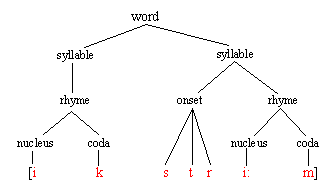A syllable is a phonological unit that is composed of one or more phonemes. Every syllable has a nucleus, which is usually a vowel (the final syllable of a word may not contain a vowel but a syllabic liquid or nasal). The nucleus may be preceded by one or more consonants called the onset and followed by one or more consonants called the coda. There is a nucleus in every syllable, but an onset and/or a coda may be absent. When words rhyme in poems and jingles, it is the nucleus and the coda of the final syllables that are identical, as shown in the following jingle:
Man is a fool
When it is hot
He wants it cool
When it is cool
He wants it hot
Always wants what is not
The syllabic unit made up by the nucleus + coda is therefore called a rhyme. The syllable structure of the word extreme, for example, can be analyzed as follows:
